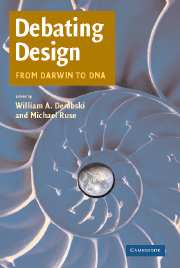6 - The Design Argument
Published online by Cambridge University Press: 05 June 2012
Summary
The design argument is one of three main arguments for the existence of God; the others are the ontological argument and the cosmological argument. Unlike the ontological argument, the design argument and the cosmological argument are a posteriori. And whereas the cosmological argument can focus on any present event to get the ball rolling (arguing that it must trace back to a first cause, namely God), design theorists are usually more selective.
Design arguments have typically been of two types – organismic and cosmic. Organismic design arguments start with the observation that organisms have features that adapt them to the environments in which they live and that exhibit a kind of delicacy. Consider, for example, the vertebrate eye. This organ helps organisms to survive by permitting them to perceive objects in their environment. And were the parts of the eye even slightly different in their shape and assembly, the resulting organ would not allow us to see. Cosmic design arguments begin with an observation concerning features of the entire cosmos – the universe obeys simple laws; it has a kind of stability; its physical features permit life, and intelligent life, to exist. However, not all design arguments fit into these two neat compartments. Kepler, for example, thought that the face we see when we look at the moon requires explanation in terms of Intelligent Design.
- Type
- Chapter
- Information
- Debating DesignFrom Darwin to DNA, pp. 98 - 129Publisher: Cambridge University PressPrint publication year: 2004
References
- 6
- Cited by



